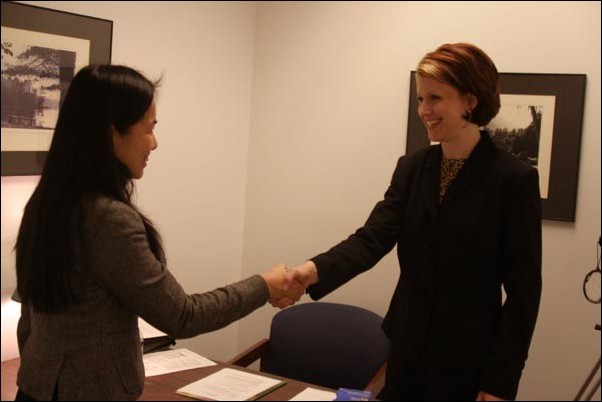Social Security future unsure
Image: Social Security future unsure:Gongpei Gu, left, shakes hands with April Ferguson after completing a mock interview in the Career Center.:Tojo Adrianarivo/State Hornet
March 2, 2005
Many Sacramento State students aren&t planning ahead to their weekends, much less their retirement.
But with the current push by the Bush administration to privatize social security, students may be forced to think about retirement sooner rather than later.
The Social Security Administration said that it can only pay full benefits until the year 2042.
Social Security, in its current form, will not be able to fulfill its promise to pay full benefits when today&s college students reach retirement age.
The privatizing transition would cost $754 billion over the next 10 years, but Bush&s administration believes this is necessary to avoid the threat of tax increases and greatly reduced future benefits if the system is not overhauled.
Some people believe that privatization of Social Security will only cause more problems. Public opinion polls say that youths tend to favor private accounts more than the elderly because they can put their money into the stock market.
When asked, most Sac State students said they haven&t followed the controversy about privatized retirement accounts because they were too busy with schoolwork, or they just hadn&t put much thought into it.
&I haven&t thought about (putting money away for retirement),& said Tyler Schade, a grad student majoring in liberal arts. &I should think about it, though. I work for my parents, and I make enough money just to get by.&
Fortunately, there are a few resources on campus that prepare students who are concerned about their future career and retirement options.
The Career Center in Lassen Hall gives students access to an entire library of job-related research materials and can schedule appointments with career counselors, who may offer advice to help students choose or change majors, find a suitable career, research employment trends and participate in special events, including mock interviews and job fairs.
&At the beginning of the semester, there&s a lot of people coming in for part-time jobs, but & we try and find out what&s their goal,& said LuAnn Furner, a career counselor assistant for the center. &Is it just money to help them get through school? But when they start getting into their junior and senior year, it&s critical for them to start getting experience in their field.&
Using the research materials at the center&s library, students can find out about estimated wages.
&Employers want to know what you will take. It can be sort of like bartering,& Furner said. &Find out as much as you can beforehand, and once the job is offered to you, that&s the time to negotiate.&
Once you obtain the job, next you must decide how to best invest the money you earn.
Management 135, taught by finance professor James Kuhle, is an applied theory course that teaches students how to invest money and how to make their investments grow.
One of the main goals of the course is to get students comfortable enough with the idea of analyzing common stocks so they can make their own investment decisions.
Kuhle also does not fall for the &media rhetoric& that claims the proposed changes to Social Security will make it insolvent.
&There&s a misconception out there about what&s being proposed,& Kuhle said. &Younger people & begin an option to invest 3 to 4 percent of their contributions in alternative investments. These alternative investments are going to be defined by the government anyway. The average return for the dollars in Social Security is around 2 to 3 percent. These alternative investments would return around 4 to 6 percent. It would do a little bit better for the younger investor.&
Kuhle feels that it is in students& best interest to gain some awareness of how to prepare for their retirement. They shouldn&t assume that the government will support them if they don&t have any financial resources.
&I tell my students, every morning you wake up, look at yourself in the mirror and say, &I&m worth it,& & and put 10 percent of your paycheck into a savings account,& Kuhle said.





























































































































